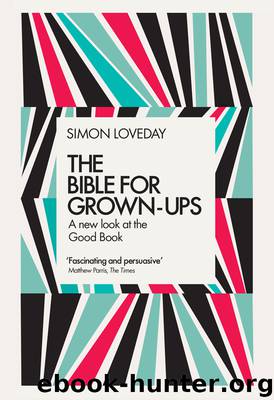The Bible for Grown-Ups by Simon Loveday

Author:Simon Loveday
Language: eng
Format: epub
Publisher: Icon Books Ltd
The context of Mark’s Gospel (about 70 AD)
The first Gospel in date of composition is Mark, written around 70 AD. What is the context in which Mark wrote? ‘Well before Mark wrote, the mission to Israel had foundered … [the Gospel of Mark’s time] was mostly proclaimed by Gentiles [to Gentiles].’35 The world of Mark’s gospel, the world of the 50s and 60s, was one in which most of the conversions were made outside Israel, and by Gentile preachers rather than by the Jerusalem-based disciples who had travelled with and learned directly from Jesus. Much of the teaching outside Israel was carried out in synagogues – because that was where ‘God-fearers’, Gentiles with an interest in faith, gathered; but the Jews who attended those synagogues were not well disposed to the new religion and many punishments were issued by the synagogue courts to those who preached (Paul writes: ‘Of the Jews five times received I forty stripes save one. Thrice was I beaten with rods, once was I stoned’, 2 Corinthians 11:24–25). Despite this, the Christian establishment of those early years, based in Jerusalem under the leadership of Jesus’ brother James, still saw the teaching of Jesus as aimed at a Jewish audience and fully consistent with the Torah – which meant in turn that they were not sympathetic to efforts to bring in Gentile converts. And in the wider world of Jewry, the level of dispute between Jews and the Roman Empire was steadily increasing.
The key issues that all four Gospel writers had to deal with were the failure of the mission to Jews; the increasing popularity of Christianity among Gentiles; and the delay of the Second Coming. How does Mark tackle these?
Mark’s answer to the first question is straightforward. The Jews rejected Jesus because Jesus had already rejected them. He did not want them to receive the new Gospel. Mark’s Jesus is sharply and consistently critical of the Torah (Mark 7:1–23, 11:27–33). This is bad enough. But Mark’s Gospel claims that Jesus made his message deliberately obscure ‘lest at any time [the Jews] should be converted, and their sins should be forgiven them’, 4:12). The ‘messianic secret’, Jesus’ constant concern to tell no one of his true identity, thus falls into place. Jesus is very selective about who he reveals his true identity to. His status as messiah and Son of God is consistently hidden from Jews until the Passion narrative – or until episodes that refer forward to it. When Jesus asks the disciples who they think he is (8:29), in an episode significantly placed right at the heart of the Gospel, the question feeds directly into a prediction of his coming death and resurrection. (Note also that Jesus neither confirms nor denies the rightness of Peter’s claim that he is the messiah, and strictly forbids the disciples to spread the news any further.)
The same pattern recurs a few verses later, after the Transfiguration: ‘he charged them that they should tell no man what things they had seen, till the Son of man were risen from the dead’ (9:9).
Download
This site does not store any files on its server. We only index and link to content provided by other sites. Please contact the content providers to delete copyright contents if any and email us, we'll remove relevant links or contents immediately.
The Five People You Meet in Heaven by Mitch Albom(3548)
The Secret Power of Speaking God's Word by Joyce Meyer(3149)
Real Sex by Lauren F. Winner(3001)
Name Book, The: Over 10,000 Names--Their Meanings, Origins, and Spiritual Significance by Astoria Dorothy(2967)
The Holy Spirit by Billy Graham(2937)
0041152001443424520 .pdf by Unknown(2840)
How The Mind Works by Steven Pinker(2809)
ESV Study Bible by Crossway(2768)
Ancient Worlds by Michael Scott(2665)
Churchill by Paul Johnson(2570)
The Meaning of the Library by unknow(2557)
The ESV Study Bible by Crossway Bibles(2543)
The Gnostic Gospels by Pagels Elaine(2515)
MOSES THE EGYPTIAN by Jan Assmann(2410)
Jesus by Paul Johnson(2347)
City of Stairs by Robert Jackson Bennett(2337)
The Complete Dead Sea Scrolls in English (7th Edition) (Penguin Classics) by Geza Vermes(2269)
The Nativity by Geza Vermes(2220)
Ancient Near Eastern Thought and the Old Testament by John H. Walton(2213)
